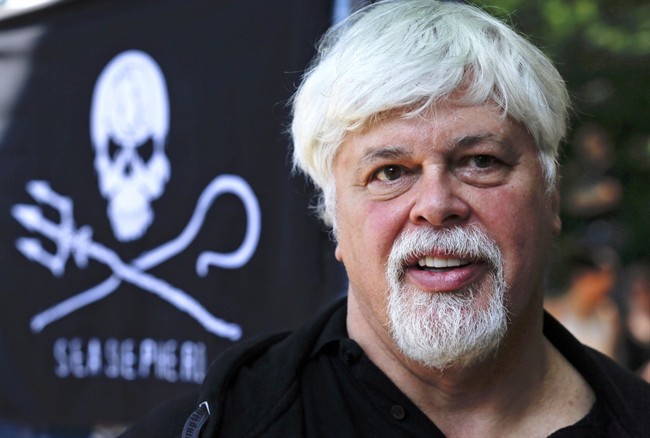SEATTLE – A fugitive anti-whaling activist known for confronting Japanese whaling vessels off Antarctica is due to testify about his actions in a U.S. court Wednesday.

Paul Watson, the Canadian founder of the Oregon-based Sea Shepherd Conservation Society, is expected to take the witness stand in a contempt of court hearing in Seattle.
The Japanese whalers argue that the organization 10 times violated an order barring its vessels from attacking or coming within a half-kilometre of the whaling ships. They’ve asked the 9th U.S. Circuit Court of Appeals to impose fines of $100,000 for each violation, though they suggested the court waive those fines as long as the protesters stop confronting their ships.
The case is part of a long-running fight between the protesters and Japan’s whaling fleet, which kills up to 1,000 whales a year, as allowed by the International Whaling Commission.
Japan is permitted to hunt the animals as long as they are killed for research and not commercial purposes, but whale meat not used for study is sold as food in Japan. Critics say that’s the real reason for the hunts.

Get daily National news
For several years, Sea Shepherd operated anti-whaling campaigns in the Southern Ocean. Activists aboard its vessels would hurl acid and smoke bombs at the whalers and drag ropes in the water to damage their propellers.
Japan’s Institute of Cetacean Research eventually sued Sea Shepherd and Watson in federal court. The 9th Circuit issued an injunction last December – just before the whaling season was to begin – and in another ruling this year described the activists as “pirates.”
“You don’t need a peg leg or an eye patch,” Chief Judge Alex Kozinski wrote.
In response to the injunction, Sea Shepherd says it withdrew from any participation in the whaling protest early this year. Instead, it says its cousin, Sea Shepherd of Australia Limited, took over – and that organization insists it wasn’t subject to the court’s order.
The hearing in Seattle, which began last week, is aimed in part at determining whether the Australian organization carried out the protest in concert with Sea Shepherd. The whalers argue that the distinction between Sea Shepherd and its Australian counterpart is largely fictional: Sea Shepherd had spent about $2.5 million preparing for the protest, including the cost of fuel and ship crews eventually used in the protest.
Watson is a white-goateed 62-year-old whose exploits have been featured on the Animal Planet reality television show “Whale Wars.” He fled from Germany last year after being arrested at the behest of the Costa Rican government, which is pursuing him on a warrant that claims he endangered a fishing crew in 2002. He has said he believes the arrest was made under pressure from Japan, and that he eventually would have been extradited there had he remained in Germany.
Jeff Hansen, director of Sea Shepherd of Australia, testified Tuesday that his organization did not co-ordinate with the American Sea Shepherd group after the injunction was issued. He said he does not believe the U.S. courts have jurisdiction over international waters – “No disrespect, of course,” he told the court.
And he vowed that no matter what the U.S. court rules, his organization will forge ahead with plans to challenge the Japanese whaling fleet early next year.
“We’re answering to our clients, which is the whales,” he said.







Comments